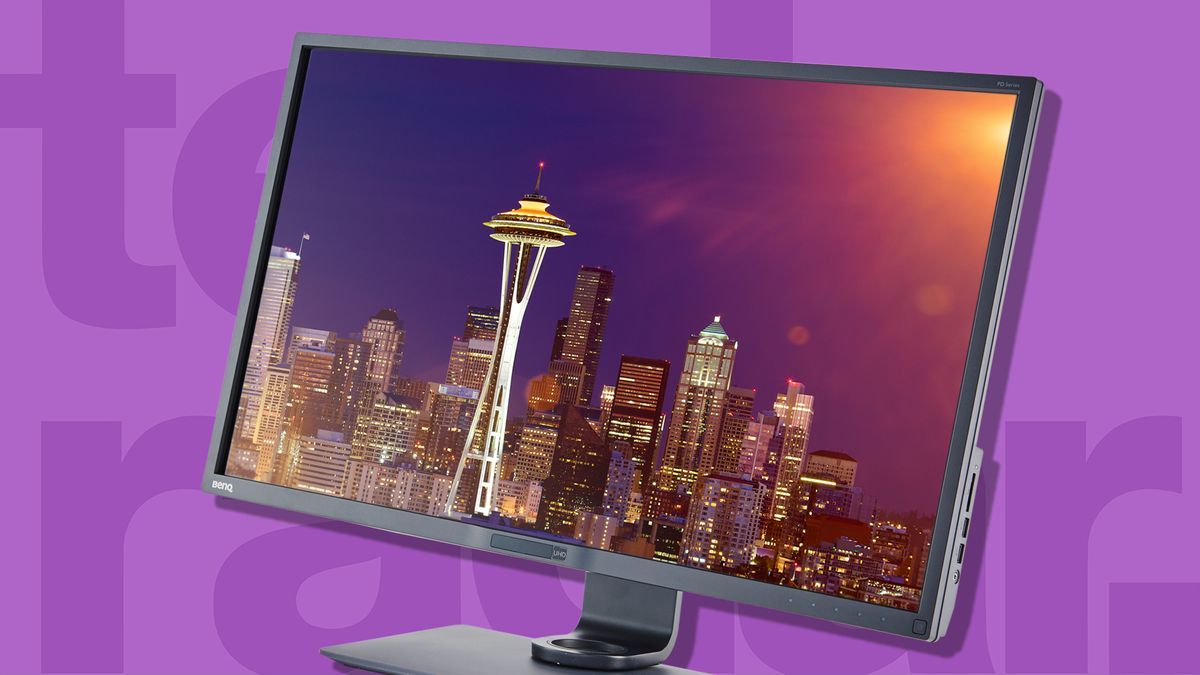
The best monitor 2024: top displays for every budget
Editor’s Note: March 2024
This month, we’ve got a new impressive entry that you’ll be hard-pressed to find rivals for: the Samsung Odyssey OLED G9, Samsung’s ultrawide gaming monitor.
Michelle Rae Uy, Reviews and Buying Guides Editor, Computing
The best monitor for you depends on your everyday needs. You don’t have to, for example, blow your budget and get the priciest, most kitted-out option if you just need something for productivity. On the other hand, a typical productivity monitor may not be enough if you need something for gaming or content creation.
Luckily, due to the the plethora of options out there, finding the ideal display for your needs isn’t hard. It’s just a matter of considering your day-to-day needs and your budget, much like you would a display’s build, performance, features, and design.
We’re also here to help. We do a lot of work with all kinds of displays over the years so we know how having the best monitor is an essential component of any PC, especially the best computer setups for work and playing PC games, whatever the case may be. And, we know which ones to recommend for every type of user, whether you’re looking for the best 5K and 8K monitors for creative work or the best high refresh rate monitor.
Below we’ve broken down our top picks of the year – from the best 144Hz 4K monitors and to the best monitors for video editing, compiling them in this handy guide to make your buying decision easier than ever. We’ve also written up a guide for how to pick the best monitor and included the best cheap gaming monitor deals to help you find what you’re looking for, no matter what your need or budget might be.
The best monitor 2024
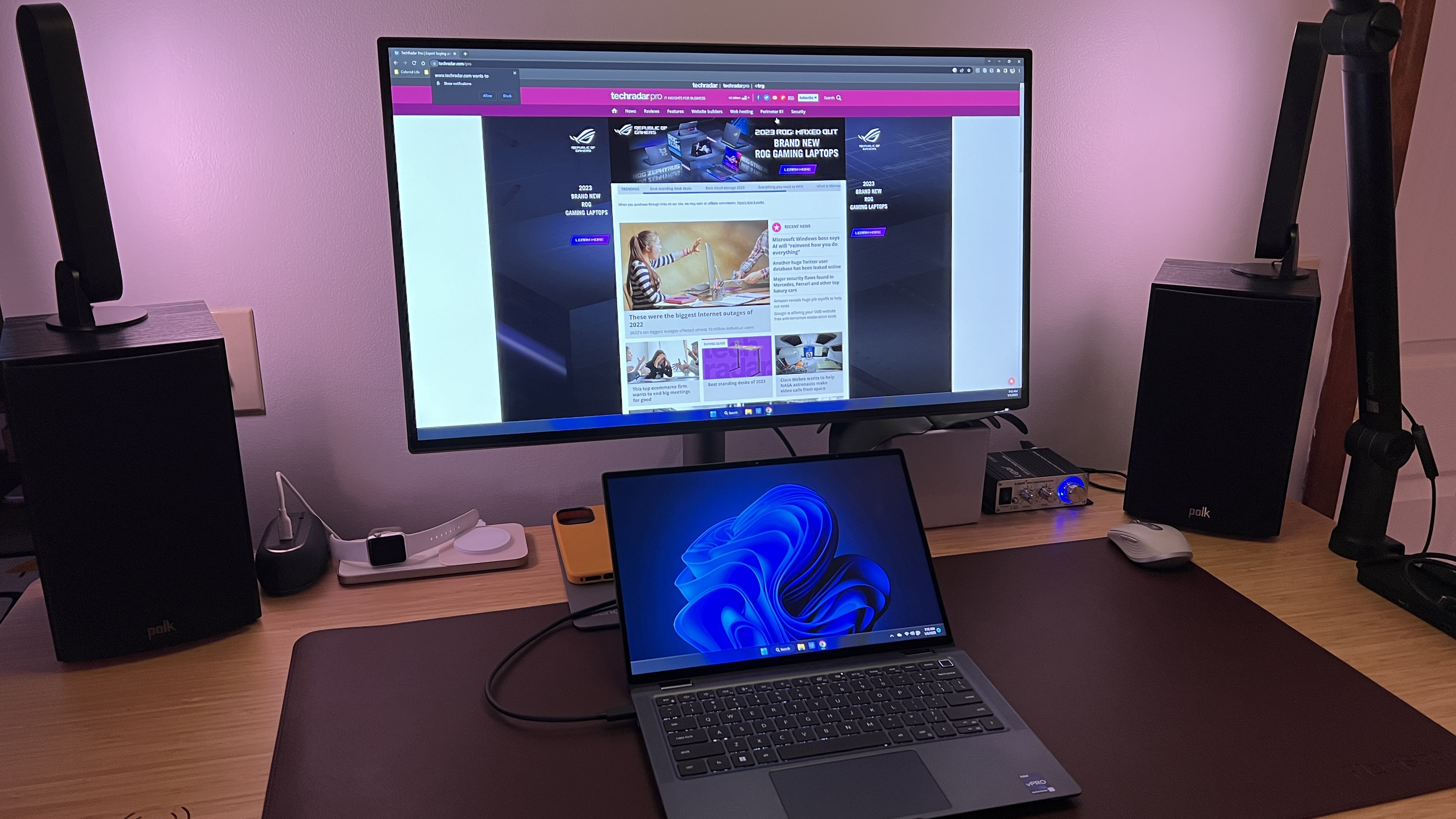
(Image credit: Future)
The best monitor overall
Specifications
Screen size: 27-inch
Aspect ratio: 16:9
Resolution: 3,840 x 2,160
Refresh rate: 60Hz
Brightness: 400 cd/m2
Response time: 5ms
Viewing angle: 178/178
Contrast ratio: 1200:1
HDR: VESA DisplayHDR400
Color support: 100% Rec.709, 100% sRGB, 95% P3
Reasons to buy
+
Excellent color accuracy
+
A wide range of connectivity options
+
Sleek design with thin bezels
Reasons to avoid
–
Expensive compared to other 4K monitors
–
Poor built-in speakers
The BenQ PD2725U may be targeted towards creative professionals, but the great thing about this Mac-friendly, Thunderbolt 3-armed 4K display is that it’s actually pretty affordable for what it offers. We found during our testing that it doesn’t just offer a range of connectivity options, boasts a sleek, modern design, and comes abundant with multitasking features like Picture-by-Picture and Picture-in-Picture modes.
Being a creator’s tool, it delivers excellent color accuracy – as well as crisp images and 95% Display P3 color coverage. So, though its built-in speakers didn’t show a lot of promise, it’s still a fantastic display for creators. However, it’s the price tag that makes it ideal for everyone else. Sure, there are much cheaper 4K options on the market – case in point, our budget pick on this list – but if you want top-notch image quality, this one is actually pretty attainable for non-pro users as well.
Read our full BenQ PD2725U review
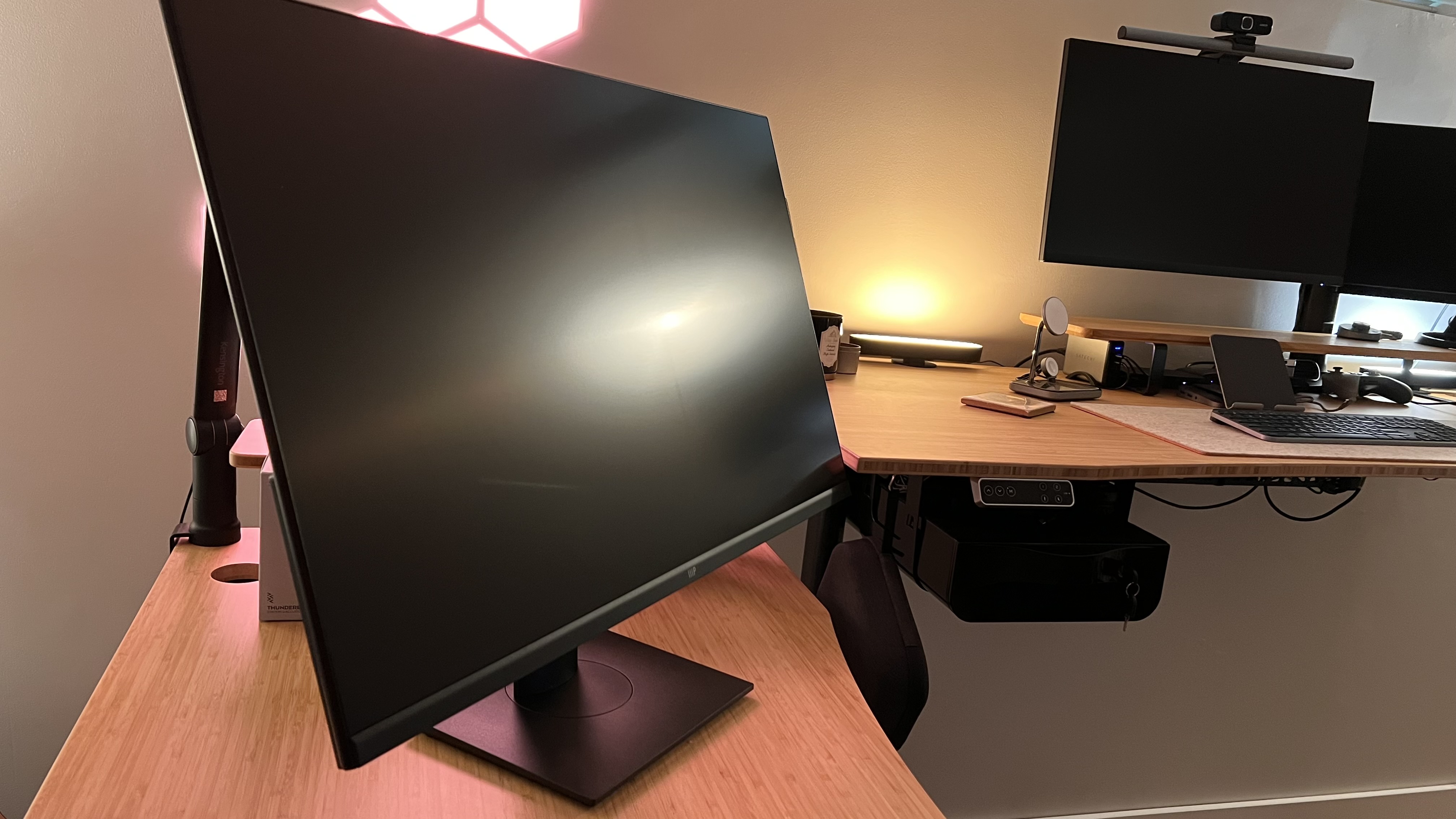
(Image credit: Future)
The best budget display
Specifications
Screen size: 32-inch
Aspect ratio: 16:9
Resolution: 3,840 x 2,160
Refresh rate: 60Hz
Brightness: 400 cd/m2
Response time: 5ms
Viewing angle: 178/178
Contrast ratio: 1200:1
HDR: VESA DisplayHDR400
Color support: 100% Rec.709, 100% sRGB, 95% P3
Reasons to buy
+
Excellent color accuracy
+
A wide range of connectivity options
+
Sleek design with thin bezels
Reasons to avoid
–
Expensive compared to other 4K monitors
–
Poor built-in speakers
There’s a handful of budget 4K monitors on the shelves, but the Monoprice 32-inch CrystalPro may just be the best of them all. Not only is this a beautiful large display with a highly-adjustable stand for ergonomics, but for a cheap 4K display, it has a surprisingly rich feature set. We especially appreciate the 65W PD charging, a USB-A hub, and a great selection of ports that allows you to connect it to four different sources.
Of course, being a budget option, it does have its limitations. For example, we were surprised at the lack of control with the HDMI port. It didn’t allow us to scale the display to the sizing and resolution we wanted when we hooked up our laptop via HDMI. However, an easy fix would be to use the DisplayPort or, more efficiently, the USB-C port, which would also charge the device.
Read our full Monoprice 32-inch CrystalPro review
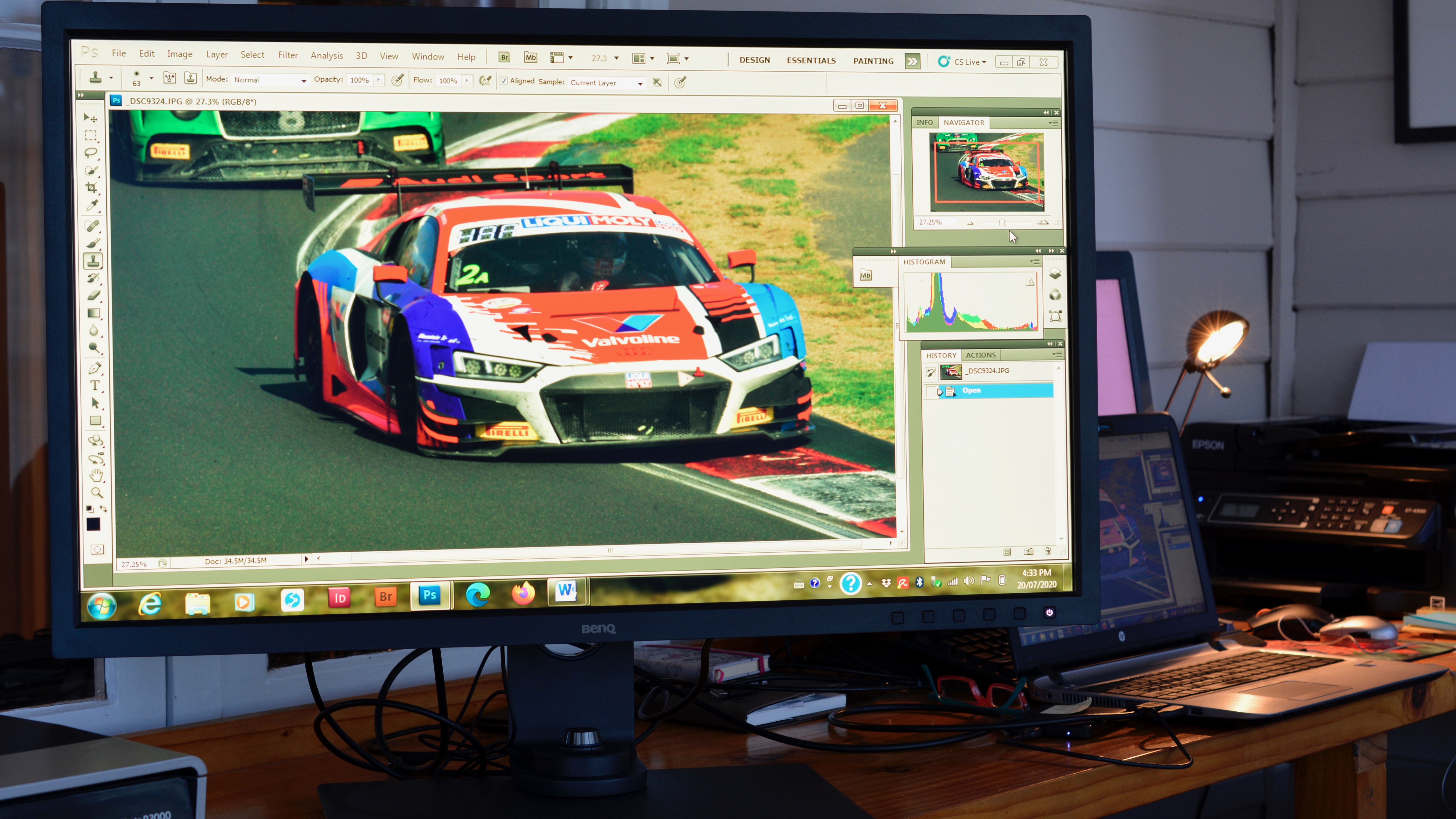
(Image credit: TechRadar)
Premium monitor for creative professionals
Specifications
Screen size: 32-inch
Aspect ratio: 16:9
Resolution: 3,840 x 2,160
Brightness: 250 cd/m2
Response time: 5ms
Viewing angle: 178/178
Contrast ratio: 1,000:1
Color support: 99% AdobeRGB, 95% P3, 100% sRGB
Weight: 25.6kg
Reasons to buy
+
Improved brightness and color uniformity
+
USB-C connectivity
Reasons to avoid
–
Main connection bay is hard to reach
Pro-level displays are no longer the premium priced, inaccessible purchase they started out to be. At least as far as the BenQ SW321C PhotoVue is concerned. This 32-inch 4K photo monitor is up a step or two in terms of both performance and usability, featuring an incredibly wide color gamut of 99% of the Adobe RGB color space and 95% of DCI-P3.
If you’re in the cinematography or photography sphere, that’s exactly what you need. To test this monitor’s performance, we ran software-based calibration using the SpyderX Elite colorimeter. And, its scores for color gamut, tone response, white point uniformity, contrast, luminance uniformity, color uniformity and color accuracy were excellent.
This monitor might be a little bit older than most, but it’s still got serious performance chops for professional users, and the fact that it’s just slightly out of date means you’re likely to find it for a bargain at a lot of retailers. And, that’s on top of all the other features this monitor boasts.
Read our full BenQ SW321C PhotoVue review
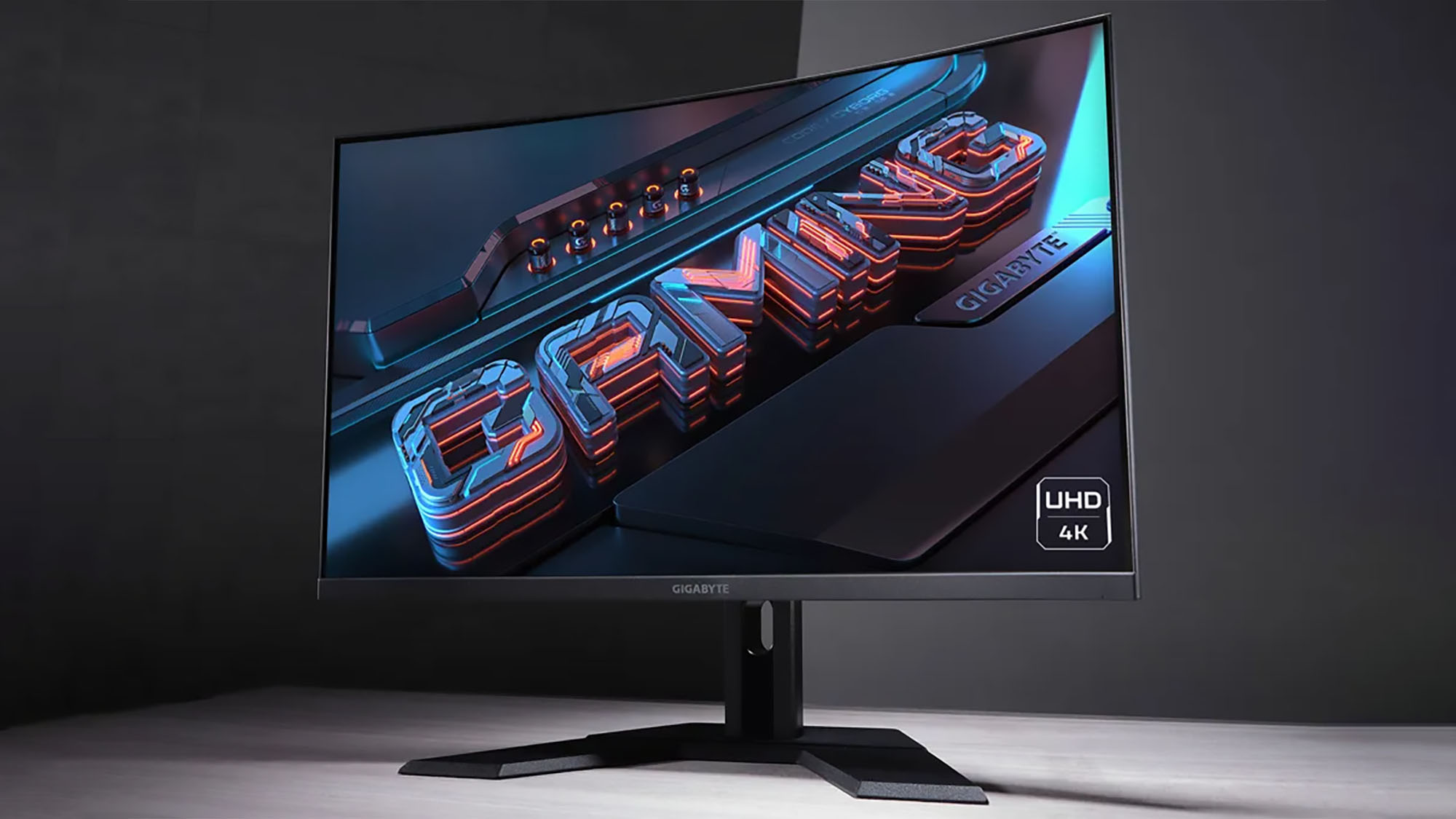
(Image credit: Gigabyte)
The best curved 4K gaming monitor for most people
Specifications
Screen size: 31.5-inch
Aspect ratio: 16:9
Resolution: 3,840 x 2,160
Refresh rate: 144Hz (160Hz OC w/ DisplayPort 1.4)
Brightness: 350 cd/m2
Response time: 1ms
Viewing angle: 178/178
Contrast ratio: 3,000:1
HDR: VESA DisplayHDR400
Color support: 93% DCI-P3, 123% sRGB
Reasons to buy
+
Great image quality and performance
+
Lots of connectivity options
+
Great value
Reasons to avoid
–
Speakers are terrible
–
Base display settings require some tinkering
Multiplatform gamers looking for a high-performance 32-inch gaming monitor for 4K at 144Hz gaming will find a lot to appreciate about the M32UC from Gigabyte. With a respectable amount of ports and other useful features, along with snappy pixel response time and great color gamut coverage, this is a great looking monitor with satisfying performance.
The only thing about it is that out of the box, we found it presenting a fairly flat and dimly lit display image even when HDR is enabled. Calibration is certainly necessary. We had to fiddle with its brightness, contrast settings, color controls and HDR settings a little bit, but when we did, the visual experience it offered was incredible.
The HDR400 support is alright, but nothing special, but when you factor in the excellent price for this kind of curved display, you get one of the best 4K monitors for gaming by value on the market. Just don’t expect much from the built-in speakers here, they barely get the job done.
Read our full Gigabyte M32UC review
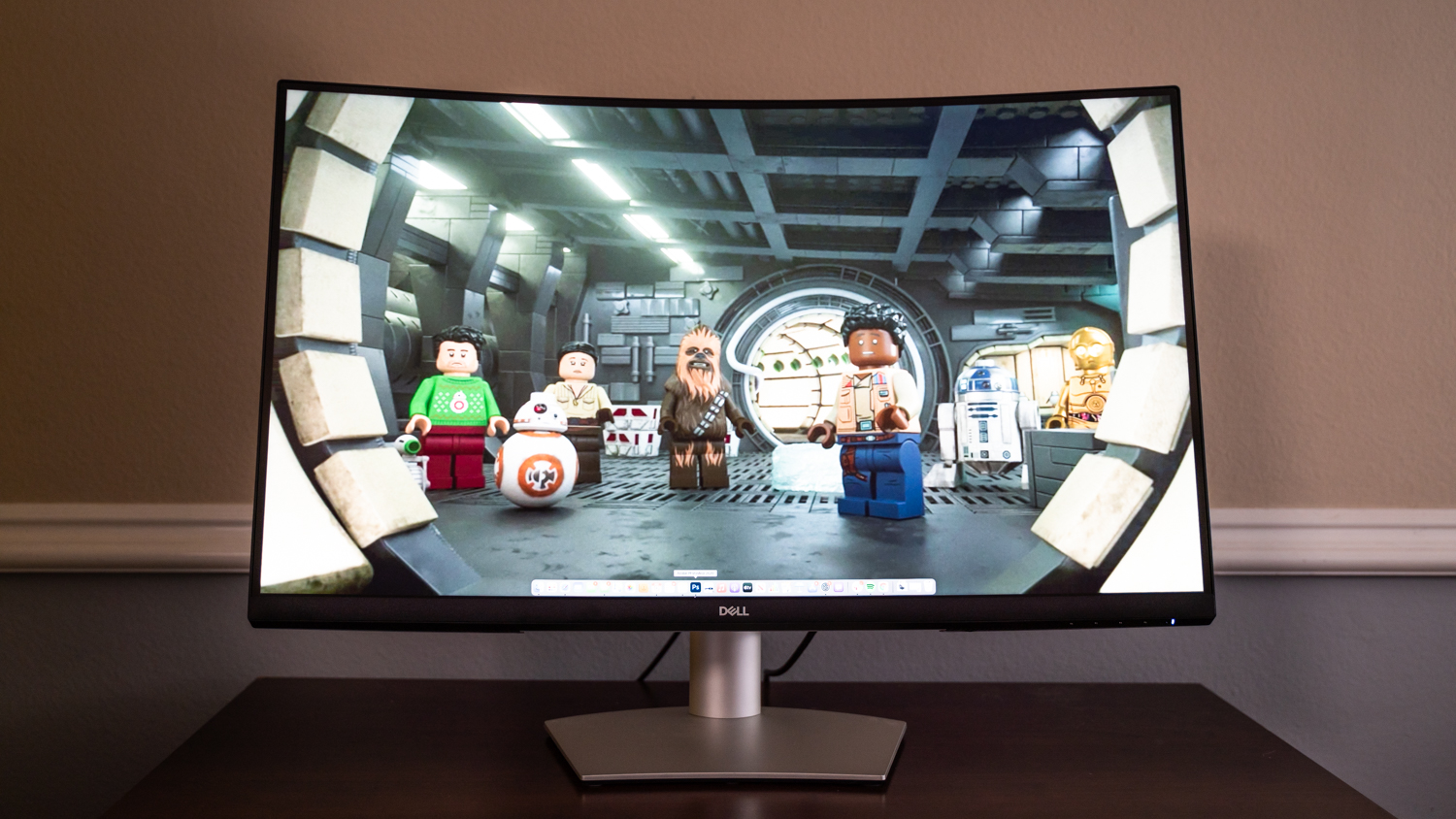
(Image credit: Dell)
The best curved 4K monitor
Specifications
Screen size: 31.5-inch
Aspect ratio: 16:9
Resolution: 3840 x 2160
Curve radius: 1800mm
Viewing angle: 178/178
Refresh rate: 60Hz
Response time: up to 4ms
Contrast ratio: 3000:1
Color support: 1.07 billion colors
Reasons to buy
+
Great looking screen
+
Unique multitasking features like PiP
+
Affordable
Reasons to avoid
–
No USB-C
–
Slow response rate
The Dell S3221QS is a gorgeous monitor inside and out. Its simple yet elegant silver design gives it a unique look that sets it apart from all the gamer-centric or boring black office monitors you’re most likely to find. It comes with a stunning 4K VA panel to match, which looks great and delivers colors that we found to be accurate and rich as well as crisp and detailed image quality. Because of the 1800R curvature, even after hours of use, there’s no eye strain.
And, to make it an even better proposition, it’s got some great features as well – namely, decent-sounding speakers and an interesting picture-in-picture functionality that will let you display two different computers in the same display. That’s pretty nifty and a great way to make up for the fact that there’s no USB-C connectivity. This model is a couple of years old at this point, but the past couple of years have been fairly slow for monitor developments, especially on the more mainstream and business-user side of things, so it can hold its own against the best business monitors out there.
Read our full Dell 4K S3221QS Curved Monitor review
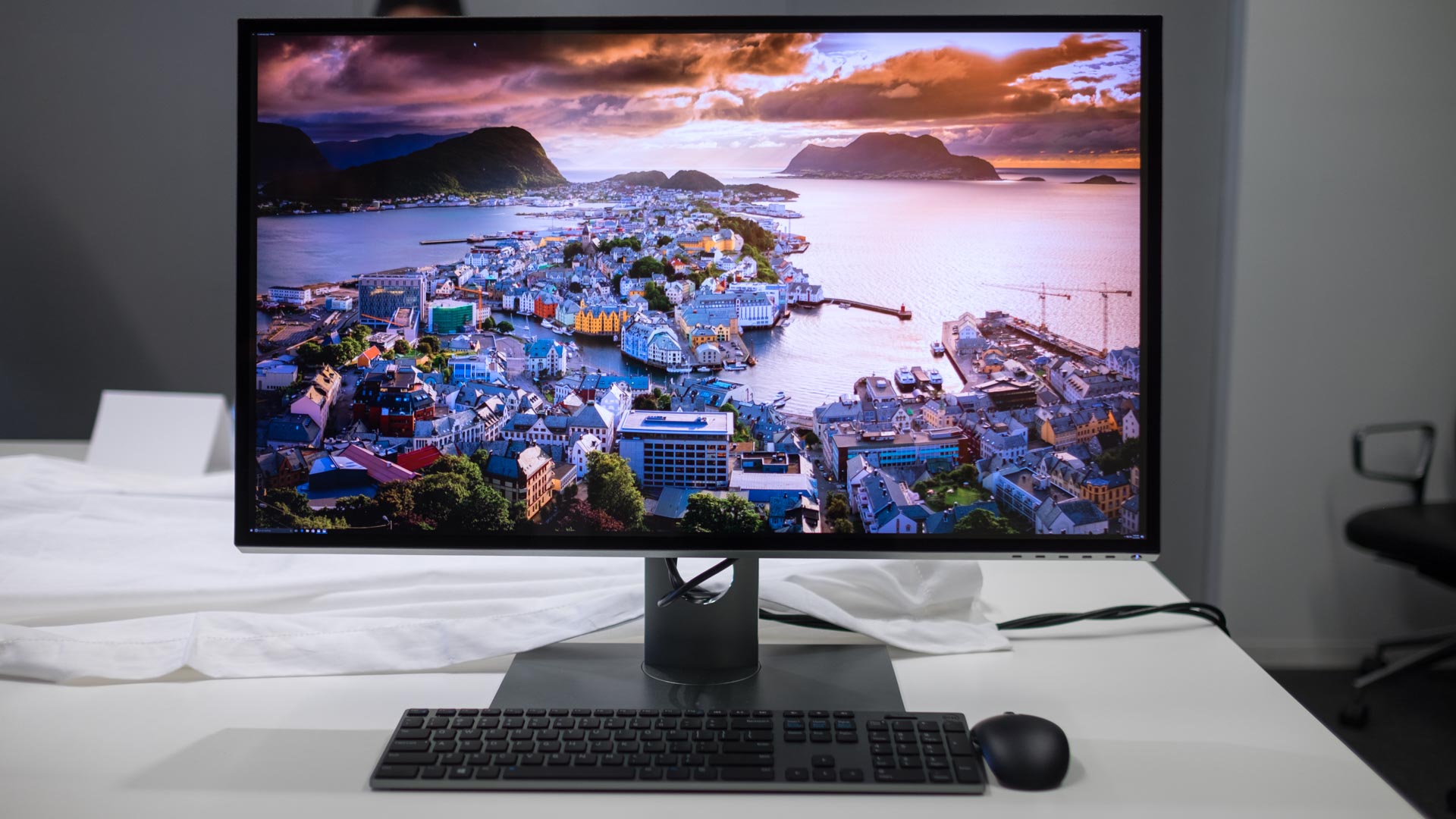
(Image credit: Future)
The best 8K monitor going – for now
Specifications
Screen size: 32-inch
Aspect ratio: 16:9
Resolution: 7,680 x 4,320
Brightness: 400 nits
Response time: 6ms
Contrast ratio: 1,300:1
Color support: sRGB 100%
Weight: 8.5kg
Reasons to buy
+
Stunning 8K resolution
+
Nice design that fits right in your office
We don’t usually run into technology that’s so far ahead of the curve that we’re left dumbfounded, which is why the Dell UltraSharp UP3218K has impressed us even more. Finding one of the best monitors that can reach the raw gorgeousness this one can should be next to impossible. It’s not just the resolution, either.
Dell went so far as to ensure that the build quality and color reproduction are the best in the business as well. The monitor is factory calibrated, so it looks great without any tinkering, and that ultra-high resolution, along with the color handling of the monitor, makes any content look incredible – so incredible that sometimes, a footage almost looks 3D with the amount of detail you’re getting.
The Dell UltraSharp UP3218K is aimed at professionals, obviously, so if that sounds like it’s made for you, it’s probably the best monitor you’ll ever find. This product is only available in the US and UK right now, and given that it’s a couple of years old at this point, it’s harder to find than most.
Read our full Dell UltraSharp UP3218K review
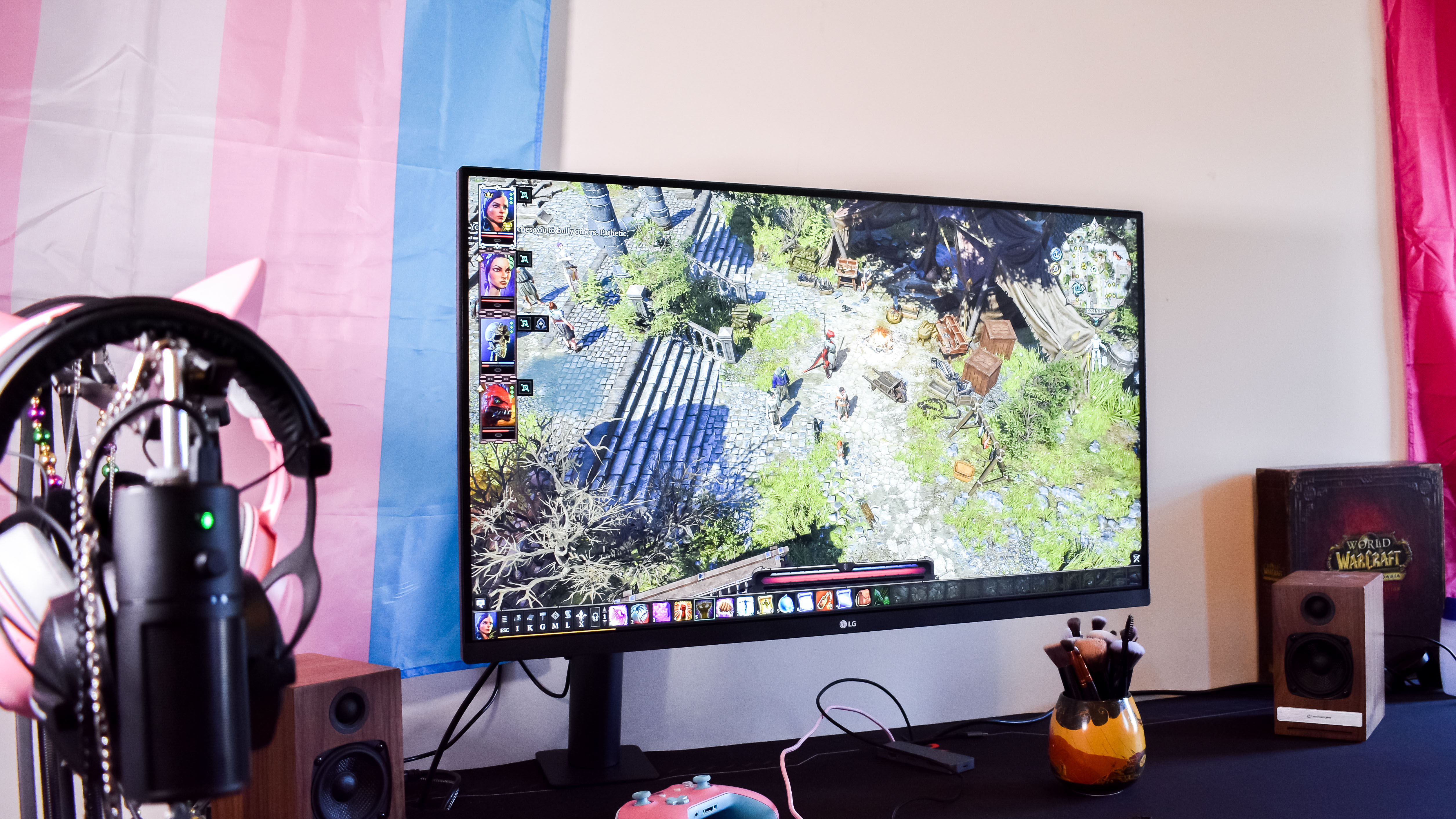
(Image credit: Future)
Great monitor with the best ergonomics
Specifications
Screen size: 32-inch
Aspect ratio: 16:9
Resolution: 3,840 x 2,160
Brightness: 350 nits
Response time: 4ms
Viewing angle: 178/178
Contrast ratio: 1,000:1
Color support: sRGB 100%
Weight: 10.30 kg
Reasons to buy
+
Versatile monitor stand that allows it to go in any direction
+
Beautiful picture quality
Reasons to avoid
–
Not bright enough for true HDR
The LG 32UN880 UltraFine Display Ergo has done something cool. Instead of going for the same homogeneous mount and stand that all monitors have, it has opted for a C-Clamp, One Click Mount that allows it to extend, retract, go high, go low, tilt and pivot like no other. That’s versatility turned up to 11.
It also boasts incredible color accuracy and beautiful picture quality. The best part is that you’re getting all that without burning a massive hole in your pocket. This is, without a doubt, among the best monitors out there, especially if you’re looking for an arm-supported display rather than one on a static stand you typically find on the shelves.
There are a number of arm-supported models coming out in the next few months though, so this monitor might lose the title of “best” in this particular class, but it is also a lot cheaper as a result, so you can’t really go wrong.
Read our full LG 32UN880 UltraFine Display Ergo review
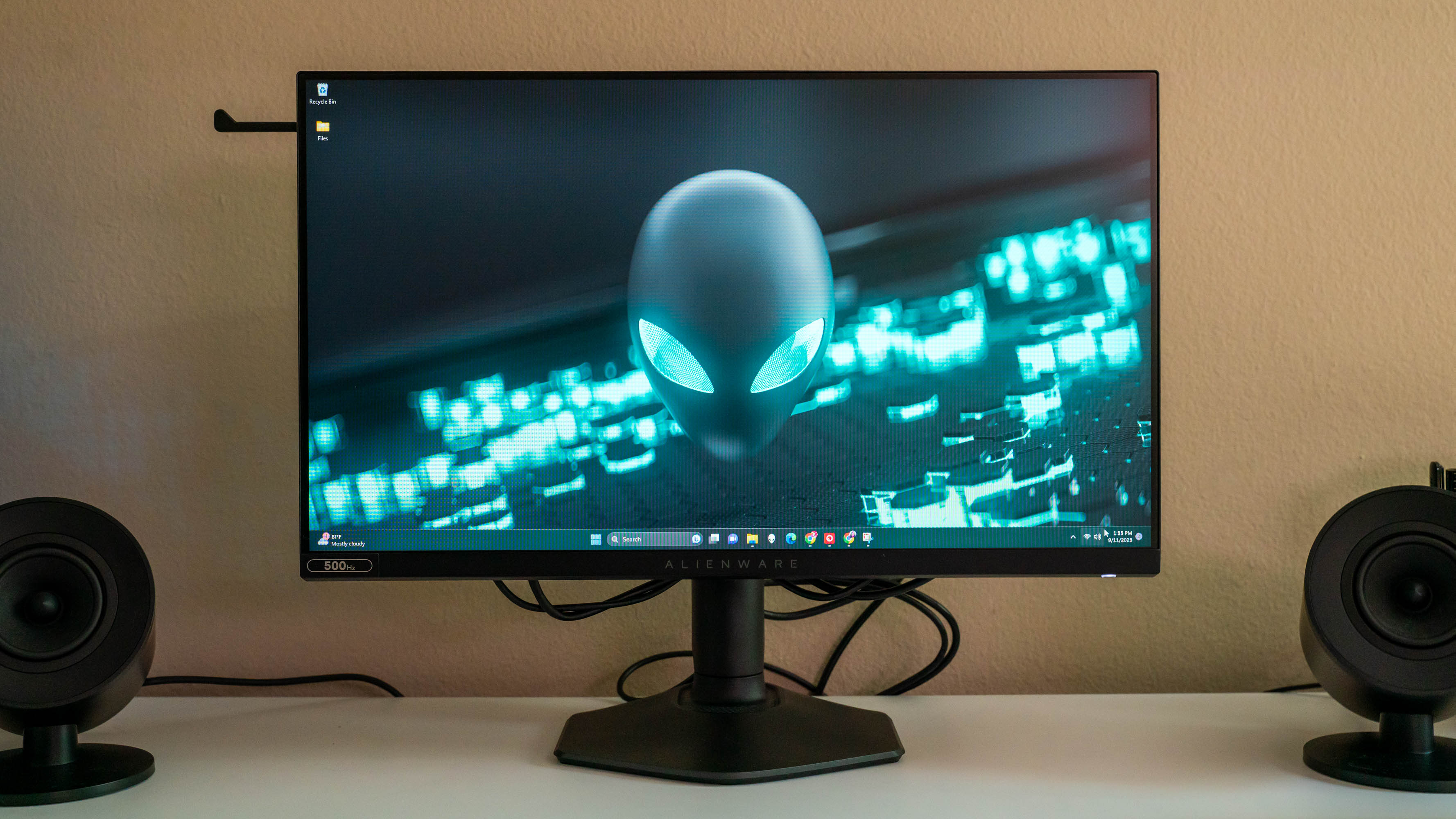
(Image credit: Future / Michelle Rae Uy)
The best 500Hz gaming monitor
Specifications
Screen size: 24.5-inch
Aspect ratio: 16:9
Resolution: 1920 x 1080
Brightness: 400 nits
Response time: 0.5ms gtg
Viewing angle: 178/178
Contrast ratio: 1,000:1
Color support: 99% sRGB
Weight: 8.05 lbs (3.65 kg)
Reasons to buy
+
Blazing-fast refresh rate
+
Great picture quality
+
Two DisplayPorts 1.4 for 500Hz/0.5ms gtg
+
More affordable than the original
Reasons to avoid
–
Less powerful PCs need not apply
–
HDR nothing to write home about
–
Less powerful PCs need not apply
In the realm of gaming monitors, the debate over the necessity of a 500Hz refresh rate persists, though most gamers currently find 144Hz sufficient for their fast-paced adventures. Alienware’s latest addition, the Alienware AW2524HF, is making waves with its 500Hz (overclocked) / 480Hz (native) refresh rate, a rarity in the market. What sets it apart from its predecessor is its $180 lower price point in the US, making it an attractive option for early adopters and a smart, future-proof investment for gamers, particularly those in the competitive scene, without significant compromises on quality.
In a world where gaming standards continue to evolve, the Alienware AW2524HF offers a compelling proposition for those seeking top-tier performance without breaking the bank, making it a noteworthy addition to the gaming monitor landscape.
Read our full Alienware AW2524H review
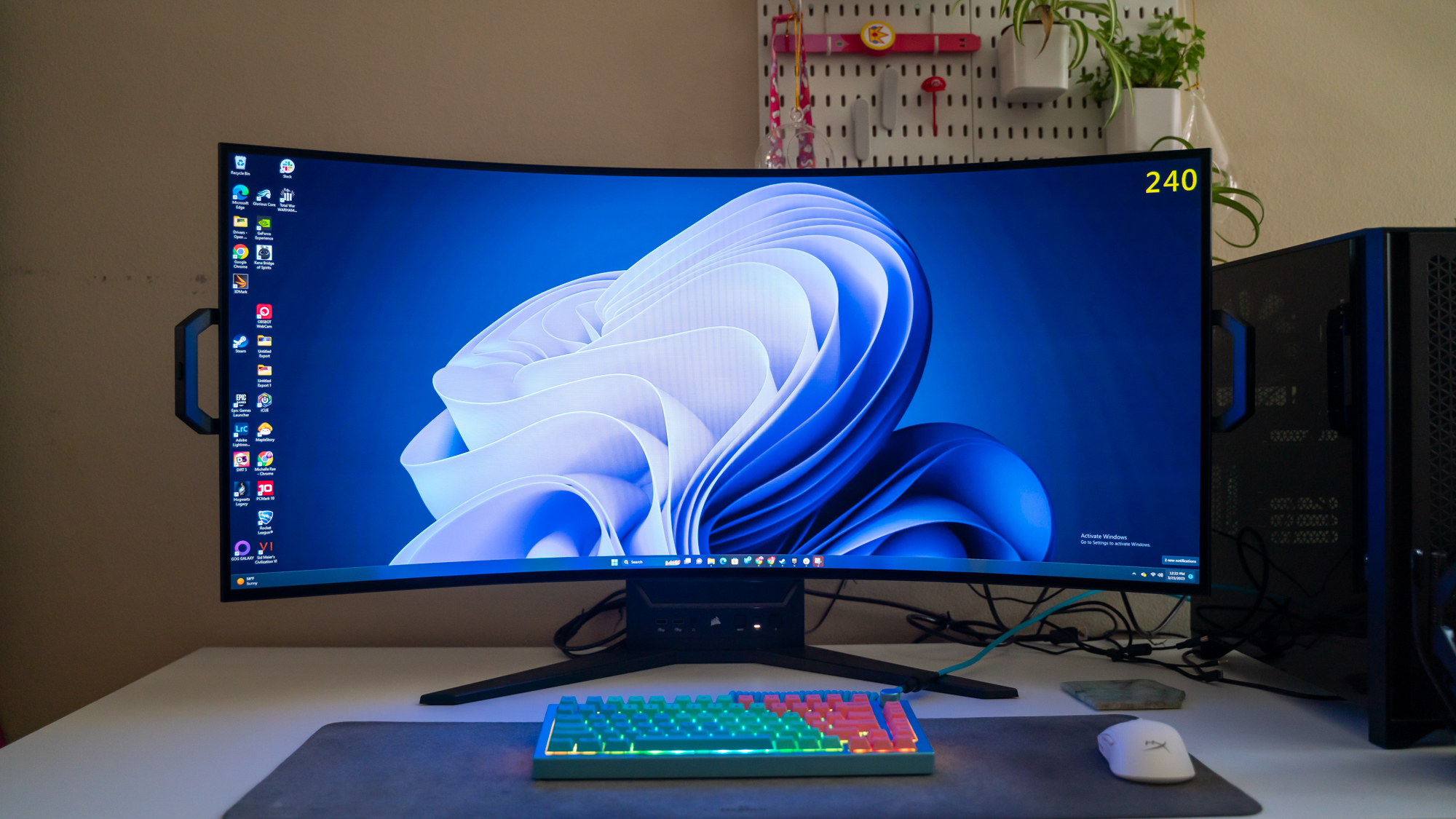
(Image credit: Future / Michelle Rae Uy)
Versatile bendable monitor for play and content creation
Specifications
Screen size: 45-inch
Aspect ratio: 21:9
Resolution: 3440×1440
Brightness: 1,000nit peak brightness
Response time: 0.03ms gtg
Viewing angle: 178/178
Contrast ratio: 1,500,000:1
Color support: 1.07B (10-bit RGB)100% sRGB, 98.5% DCI-P3, 96.3% AdobeRGB
Weight: 7.7lb (3.5 Kg)
Reasons to buy
+
Excellent picture quality
+
Allows you to shift genres without sacrificing immersion
+
Rich colors with deep blacks
Reasons to avoid
–
No swivel or height adjustments
–
Bending mechanism still feels clunky
–
Expensive piece of kit
Bendable monitors are fairly new in the gaming world, but if you want to be an early adopter, the Corsair Xeneon Flex 45WQHD240 has just made a solid case about needing them. This versatile gaming monitor lets you enjoy pretty much every game genre as they’re meant to be visually enjoyed, thanks to its bendable panel that offers up to 800R of deep curvature.
The bending mechanism is still a little clunky, in our humble opinion, but we didn’t really find it to be particularly hard to control in our testing. And it just gave us flexibility, enjoying different genres on one screen. Of course, this being OLED, we also appreciated the vivid colors and deep blacks, making streaming videos a lot more enjoyable and immersive. And while it’s only 1440p and its pixel count is mediocre, the visuals are still plenty sharp. Plus, there’s a lot of space for productivity as well.
The only thing we can complain about here, besides the staggering price, is the lack of swivel and height adjustment. But at least, there’s tilt so that’s something.
Read our full Corsair Xeneon Flex 45WQHD240 review
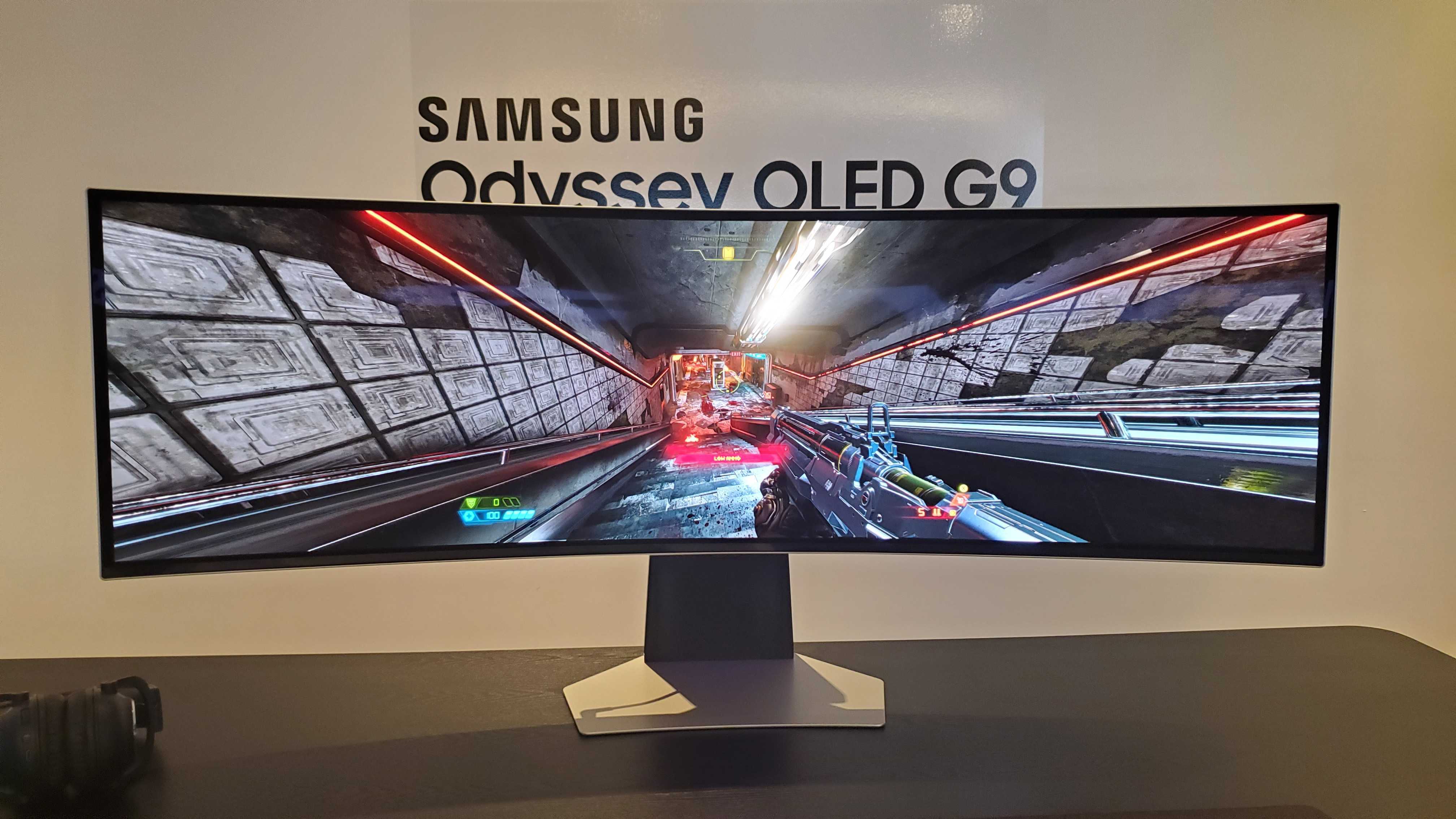
(Image credit: Future)
The best ultrawide monitor
Specifications
Screen size: 49-inch
Aspect ratio: 32:9
Resolution: 5,120 x 1,440
Brightness: 250 nit peak brightness
Response time: 0.03ms gtg
Viewing angle: 178/178
Contrast ratio: 1,000,000:1
Color support: 1.07B 99% DCI-P3
Weight: 28.4lb (12.9Kg)
Reasons to buy
+
Drop dead gorgeous display
+
No eye strain
+
Beautiful design and RGB lighting
+
Comes with tons of built-in features
Reasons to avoid
–
Extremely expensive
–
Pretty large
–
Not many position adjustment options
Though we are still in the middle of our Samsung Odyssey OLED G9 testing, we have previewed it at its launch event and are already pretty confident that this 4K curved monitor offer an excellent and truly premium viewing experience. That’s whether you’re looking for a gaming monitor or a monitor to suit all your needs, including multitasking at work.
The 49-inch display size, 5,120 x 1,440 resolution, and 32:9 aspect ratio may sound absolutely ridiculous on paper, but after seeing it in person, we’re convinced. With its impressively wide display and vibrant colors combined with its 1800R curvature, it’s a dream and absolutely immersive to game on.
During our hands-on, we didn’t feel any eye or neck strain – quite a feat considering its size and how close we were to it. And thanks to the unbelievably high 240Hz refresh rate and speedy 0.03ms response time, games like Forza Horizons 5, Planet of Lana, and Doom: Eternal stayed smooth and crisp during our albeit short time with it.
It is, to be fair, quite an investment, and it does require some pretty robust hardware to power it. But if you can afford to splurge, you won’t regret getting it. Stay tuned for our full review.
How to choose the best monitor for you
How to choose the best monitor for you
To answer this, first, you need to ask what you need it to do.
Are you competing in esports? Then you need to go for the lowest pixel response rate you can afford (at least 1ms but even lower if possible), even if it means sacrificing image quality. All that matters is winning, after all, victory doesn’t have to be pretty.
Are you a visual content creator, a photographer, or a graphic designer? Then you will definitely need a monitor that has the widest possible color coverage, usually given in percentage of various gamuts. sRGB is the gamut that covers the web, while DCI-P3 is the industry standard for films, and the Adobe gamut covers illustrators and photographers for the most part. Regardless of your use case, you need to get as close to 100% of your particular gamut as possible.
If you’re on a high-end gaming desktop with the best graphics card on the market, then a 4K monitor or even an 8K display might be more of what you’re looking for. 4K monitors are only just now starting to get higher refresh rates like 120Hz and 144Hz, so these are definitely the 4K panels that you need to keep an eye out for.
Which monitor brand is most reliable?
There are a lot of PC monitor brands out there making everything from cheap, portable office monitors to high-end gaming PC monitors with ultrawide aspect and 1000R curve rating, 1ms pixel response, and blazing fast refresh rates.
Among the best brands in this regard are Dell, Alienware, BenQ, Acer, LG, Samsung, HP, Lenovo, and Asus, but they are by no means the only ones.
Which monitor quality is best?
Well, this really depends on a couple of factors, but first and foremost is your use case.
If you’re just a typical PC gamer looking for the best image quality, getting a 4K monitor with 144Hz refresh is going to make your games look fantastic. If you’re an esports competitor (or want to be someday), then the only thing that matters is pixel response and refresh rate. Even a 1080p resolution is acceptable so long as it has at least 1ms pixel response or lower. The refresh on 1080p monitors can go as high as 360Hz or even higher with the very latest monitors coming onto the market.
For most people though, a 1440p monitor is often more than enough, since the jump from 1440p to 4K isn’t nearly as impressive as the jump from 1080p to 1440p.
What is best screen size for 4K?
Depending on how far away from the screen you are, there will be a point where it just doesn’t benefit you to upgrade to a new monitor with a higher resolution.
Typically, 32 inches is considered the best monitor size since this is the size where a person sitting about 3 feet away from a screen will be able to see the difference between 4K and 1440p. The difference isn’t going to be huge, but it will be there.
How we test monitors
Why you can trust TechRadar
We spend hours testing every product or service we review, so you can be sure you’re buying the best. Find out more about how we test.
We review monitors based on a number of factors including price, design, and performance. We consider the size of each display, as well as the number and type of ports on each monitor to determine who each display would benefit most. Each monitor is used in a variety of scenarios, so we use it for work, media consumption and gaming to test what it’s best suited to.
Performance is also evaluated by how well the actual screen tech works and its refresh rate. Frames per second are especially important in gaming monitors because you’ll want a high refresh rate during competitive games so you don’t miss a minute of the action.


